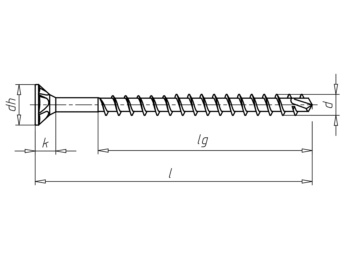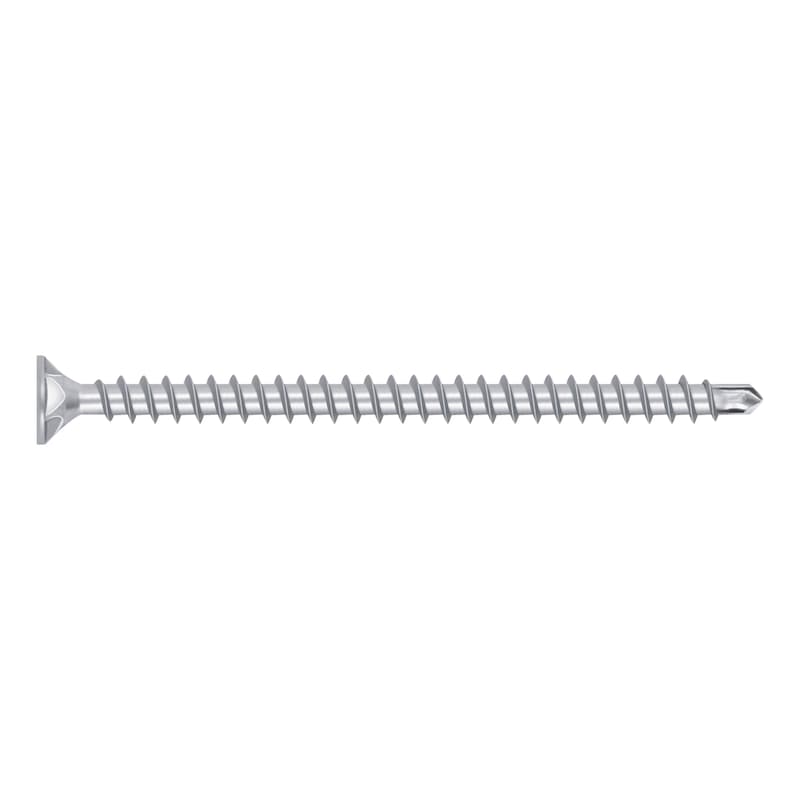![ASSYplus 스틸 아연도금 FT CS-MPK AW - SCR-CS-MPK-VG-AW40-(A3K)-8,0X330/305]()
When designing houses with a wooden frame construction, it was common up until now to produce the walls in the entire storey. The ceiling beam position therefore lay on the wall frame of the lower storey in each case. As a result, the air-tight level and the outer wall insulation were penetrated by the beam. Therefore, there is an increasing tendency to have the outer walls traverse above storey level. Thanks to edge beam fastening with ASSY®plus VG full-thread screws, the fastening of the footing beams/edge beams can now be produced quickly, efficiently and easily. With this design version, the screw-in template VG-Fix is also suitable for adjusting the screw-in angle and the screw spacing.
![ASSYplus 스틸 아연도금 FT CS-MPK AW - SCR-CS-MPK-VG-AW40-(A3K)-8,0X330/305]()
Current rafter-purlin anchors require time-consuming assembly and also have a low load-bearing capacity. The ASSYplus VG therefore represents an efficient alternative. The existing weak point of a standard countersunk head screw, the main beam, can be ignored with the ASSYplus VG.
![ASSYplus 스틸 아연도금 FT CS-MPK AW - SCR-CS-MPK-VG-AW40-(A3K)-8,0X330/305]()
![ASSYplus 스틸 아연도금 FT CS-MPK AW - SCR-CS-MPK-VG-AW40-(A3K)-8,0X330/305]()
In the construction of commercial and industrial buildings, the rafter-supporting purlins are generally formed as coupling purlins. The coupling is used to achieve more favourable wood cross-sections than with single-field beams. This new connection type saves time and money in jointing and mounting. An ASSY SK screw (consolidation) and, depending on the load, ASSY plus VG screws are inserted at right angles at each connection point. There is then no need for predrilling. The wood cross-sections can be kept small due to the short edge distances. The complex milling out of the anchors is then eliminated. Only one strong cordless drill is required for installation. The purlins can be cut to length by the saw mill and delivered directly to the construction site. The purlins are pulled together with the ASSY SK disk head screw. No additional clamping tools are required. Dimensioning tables were prepared for the static calculation of the connections, which can be requested via the Würth salesperson.
![ASSYplus 스틸 아연도금 FT CS-MPK AW - SCR-CS-MPK-VG-AW40-(A3K)-8,0X330/305]()
![ASSYplus 스틸 아연도금 FT CS-MPK AW - SCR-CS-MPK-VG-AW40-(A3K)-8,0X330/305]()
![ASSYplus 스틸 아연도금 FT CS-MPK AW - SCR-CS-MPK-VG-AW40-(A3K)-8,0X330/305]()
Timber-concrete composite floor
Floor renovation employing a wood and concrete composite is the optimum method for increasing the load-bearing capacity where the beam spacings and support widths are particularly great, or where there are very high rated loads. Here, partly screwed-in full-thread screws serve as shear connectors and absorb the shear flow between the wooden beams and concrete slab. This eliminates the time-consuming installation of shear connectors made from expanded metal. ASSY®plus VG has its own construction product approval (Z-9.1-648) for this method. Project-related calculations with static verification can be carried out with the "technical software 6.0".
![ASSYplus 스틸 아연도금 FT CS-MPK AW - SCR-CS-MPK-VG-AW40-(A3K)-8,0X330/305]()
It is often necessary to reinforce existing beams, especially when renovating old buildings. With the reinforcement types of false edge and lateral support beam reinforcement, the ASSY plus VG screw offers effective, cost-efficient technologies for increasing load-bearing capacity of the beams and reducing bending.
![ASSYplus 스틸 아연도금 FT CS-MPK AW - SCR-CS-MPK-VG-AW40-(A3K)-8,0X330/305]()
Until now, main/secondary support beam connections had been made with moulded metal parts, such as joist hangers. The ASSYplus VG screw provides a time-saving and invisible alternative. By screwing in the ASSYplus VG at an angle of 45°, the screws absorb the lateral forces of the connection. Ideal for application: Setting template VG-Fix
![ASSYplus 스틸 아연도금 FT CS-MPK AW - SCR-CS-MPK-VG-AW40-(A3K)-8,0X330/305]()
Until now, it has been necessary to create reinforcements in order to prevent the failure of support beams, for example by using glued-on wooden material panels or glued-in threaded rods. The full-thread screw ASSY®plus VG represents a quick, and above all non-visible, alternative to this.


































































































